- Home
- William Gibson
Mona Lisa Overdrive Page 22
Mona Lisa Overdrive Read online
Page 22
Her mother came to her as she made her way to Margate Road.
Sally was in jeopardy, somewhere in the Sprawl, and Kumiko trusted that Tick would know a way to contact her. If not by phone then through the matrix. Perhaps Tick knew Finn, the dead man in the alley.…
In Brixton, the coral-growth of the metropolis had come to harbor a different life. Faces dark and light, uncounted races, the brick facades washed with a riot of shades and symbols unimaginable to the original builders. A drumbeat pulsed from a pub’s open door as she passed, heat and huge laughter. The shops sold foodstuffs Kumiko had never seen, bolts of bright cloth, Chinese handtools, Japanese cosmetics.…
Pausing by that bright window, the display of tints and blushes, her own face reflected in the silver backing, she felt her mother’s death fall on her out of the night. Her mother had owned things like this.
Her mother’s madness. Her father would not refer to it. Madness had no place in her father’s world, though suicide did. Her mother’s madness was European, an imported snare of sorrow and delusion.… Her father had killed her mother, Kumiko had told Sally, in Covent Garden. But was it true? He had brought doctors from Denmark, from Australia, and finally from Chiba. The doctors had listened to the dreams of the princess-ballerina, had mapped and timed her synapses and drawn samples of her blood. The princess-ballerina had refused their drugs, their delicate surgeries. “They want to cut my brain with lasers,” she had whispered to Kumiko.
She’d whispered other things as well.
At night, she said, the evil ghosts rose like smoke from their boxes in Kumiko’s father’s study. “Old men,” she’d said, “they suck our breath away. Your father sucks my breath away. This city sucks my breath away. Nothing here is ever still. There is no true sleep.”
In the end, there had been no sleep at all. Six nights her mother sat, silent and utterly still, in her blue European room. On the seventh day, she left the apartment alone—a remarkable feat, considering the diligence of the secretaries—and made her way to the cold river.
But the backing of the display was like Sally’s glasses. Kumiko took the Korean’s map from the sleeve of her sweater.
There was a burnt car beside the curb in Margate Road. Its wheels were missing. She paused beside it, and was scanning the unrevealing faces of the houses opposite, when she heard a sound behind her. Turning to find a twisted gargoyle face, under a greasy spill of curls, in the light from the half-open door of the nearest house.
“Tick!”
“Terrence,” he said, “actually,” as the facial convulsion subsided.
Tick’s flat was on the top floor. The lower floors were empty, unoccupied, peeling wallpaper showing ghostly traces of vanished pictures.
The man’s limp was more obvious as he climbed the stairs ahead of her. He wore a gray sharkskin suit and thick-soled suede oxfords the color of tobacco.
“Been expecting you,” he said, hauling himself up another step, another.
“You have?”
“Knew you’d run from Swain’s. Been logging their traffic, when I’ve had time from the other.”
“The other?”
“You don’t know, do you?”
“Excuse me?”
“It’s the matrix. Something’s happening. Easier to show you than try to explain it. As though I could explain it, which I can’t. I’d say a good three-quarters of humanity is jacked at the moment, watching the show.…”
“I don’t understand.”
“Doubt anyone does. There’s a new macroform in the sector that represents the Sprawl.”
“A macroform?”
“Very large data-construct.”
“I came here to warn Sally. Swain and Robin Lanier intend to give her to the ones who plot to kidnap Angela Mitchell.”
“Wouldn’t worry about that,” he said, reaching the head of the stairs. “Sally’s already scooped Mitchell and half-killed Swain’s man in the Sprawl. They’re after her in any case, now. Bloody everybody’ll be after her, soon. Still, we can tell her when she checks in. If she checks in …”
Tick lived in a single large room whose peculiar shape suggested the removal of walls. Large as it was, it was also very crowded; it looked to Kumiko as though someone had deployed the contents of an Akihabara module shop in a space already filled, gaijin-style, with too many pieces of bulky furniture. In spite of this, it was startlingly neat and tidy: the corners of magazines were aligned with the corners of the low glass table they rested on, beside an unused black ceramic ashtray and a plain white vase of cut flowers.
She tried Colin again, while Tick filled an electric kettle with water from a filter jug.
“What’s that?” he asked, putting down the jug.
“A Maas-Neotek guide unit. It’s broken now; I can’t make Colin come.…”
“Colin? It’s a stim rig?”
“Yes.”
“Let’s have a look.…” He held out his hand.
“My father gave it to me.…”
Tick whistled. “Thing cost a fortune. One of their little AIs. How’s it work?”
“You close your hand around it and Colin’s there, but no one else can see or hear him.”
Tick held the unit beside his ear and shook it. “It’s broken? How?”
“I dropped it.”
“It’s just the housing that’s broken, see. The biosoft’s come away from the case, so you can’t access it manually.”
“Can you repair it?”
“No. But we can access it through a deck, if you want.…” He returned it. The kettle was boiling.
Over tea, she told him the story of her trip to the Sprawl and Sally’s visit to the shrine in the alley. “He called her Molly,” she said.
Tick nodded, winked several times in rapid succession. “What she went by, over there. What did they talk about?”
“A place called Straylight. A man called Case. An enemy, a woman …”
“Tessier-Ashpool. Found that for her when I rustled Swain’s data flow for her. Swain’s shopping Molly to this lady 3Jane, so called; she has the juiciest file of inside dirt you could imagine—on anything and anyone at all. I’ve been bloody careful not to look too closely at any of that. Swain’s trading it right and left, making a dozen fortunes in the process. I’m sure she’s got enough dirt on our Mr. Swain as well.…”
“And she is here, in London?”
“In orbit somewhere, looks like, though some people say she’s dead. I was working on that, actually, when the big fella popped into the matrix.…”
“Excuse me?”
“Here, I’ll show you.” When he returned to the white breakfast table, he carried a shallow square black tray with a number of tiny controls arranged along one side. He placed it on the table and touched one of the minute switches. A cubical holo display blinked on above the projector: the neon gridlines of cyberspace, ranged with the bright shapes, both simple and complex, that represented vast accumulations of stored data. “That’s all your standard big shits. Corporations. Very much a fixed landscape, you might say. Sometimes one of ’em’ll grow an annex, or you’ll see a takeover and two of them merge. But you aren’t likely to see a new one, not on that scale. They start small and grow, merge with other small formations.…” He reached out to touch another switch. “About four hours ago”—and a plain white vertical column appeared in the exact center of the display—“this popped up. Or in.” The colored cubes, spheres, and pyramids had rearranged themselves instantly to allow for the round white upright; it dwarfed them entirely, its upper end cut off smoothly by the vertical limit of the display. “Bastard’s bigger than anything,” Tick said, with a certain satisfaction, “and nobody knows what it is or who it belongs to.”
“But someone must know,” Kumiko said.
“Stands to reason, yes. But people in my line of work, and there’s millions of us, haven’t been able to find out. That’s stranger, in some ways, than the fact that the thing’s there at all. I was all up and dow
n the grid, before you came, looking for any jockey with a clue. Nothing. Nothing at all.”
“How could this 3Jane be dead?” But then she remembered the Finn, the boxes in her father’s study. “I must tell Sally.”
“Nothing for that but waiting,” he said. “She’ll probably phone in. In the meantime, we could have a go accessing that pricey little AI of yours, if you like.”
“Yes,” she said, “thank you.”
“Only hope those Special Branch types in Swain’s pay don’t track you here. Still, we can only wait.…”
“Yes,” Kumiko said, not at all pleased with the idea of waiting.
35
THE FACTORY WAR
Cherry found him with the Judge again, down there in the dark. He was sitting on one of the Investigators with a flashlight in his hand, shining it up the Judge’s carapace of polished rust. He didn’t remember coming here, but he couldn’t feel the jerky edge of Korsakov’s. He remembered the girl’s eyes, in that room Bobby said was London.
“Gentry’s got the Count and his box jacked into a cyberspace deck,” Cherry said. “You know that?”
Slick nodded, still looking up at the Judge. “Bobby said we better.”
“So what’s going on? What happened when you both jacked?”
“Gentry and Bobby, they kind of hit it off. Both crazy the same way. When we jacked, we came out somewhere in orbit, but Bobby wasn’t there.… Then Mexico, I think. Who’s Tally Isham?”
“Stim queen when I was little. Like Angie Mitchell is now.”
“Mitchell, she was his squeeze.…”
“Who?”
“Bobby. He was telling Gentry about it, in London.”
“London?”
“Yeah. We went there, after Mexico.”
“And he said he was Angie Mitchell’s old man? Sounds crazy.”
“Yeah, but he said that’s how he got on to it, that aleph thing.” He swung the light down and directed it into the skeletal steel maw of the Corpsegrinder. “He was hanging out with rich people and heard about it. Called it a soul-catcher. The people who had it would rent time on it to these rich people. Bobby tried it once, then he went back and stole it. Took it down to Mexico City and started spending all his time in there. But they came after him.…”
“Sounds like you’re remembering things, anyway.”
“So he got out of there. Went up to Cleveland and made a deal with Afrika, gave Afrika money to hide him, take care of him while he was under the wire, because he was getting real close.…”
“Close to what?”
“Don’t know. Something weird. Like when Gentry talks about the Shape.”
“Well,” she said, “I think it might kill him, being jacked that way. His signs are starting to screw up. He’s been on those drips too long. Why I came to find you.”
The Corpsegrinder’s steel-fanged guts glinted in the flashlight’s beam. “It’s what he wants. Anyway, if he paid the Kid, it’s like you’re working for him. But those guys Bird saw today, they’re working for the people from L.A., the ones Bobby stole the thing from.…”
“Tell me something.”
“What?”
“What are these things you build? Afrika said you were this crazy white guy built robots out of junk. Said in the summer you take ’em out there on the rust and stage big fights—”
“They aren’t robots,” he interrupted, swinging the flash to the low, scythe-tipped arms of the spider-legged Witch. “They’re mainly radio-controlled.”
“You just build ’em to wreck ’em?”
“No. But I have to test them. See if I got them right …” He clicked off the light.
“Crazy white guy,” she said. “You gotta girl out here?”
“No.”
“Get a shower. Maybe shave …” Suddenly she was very close to him, her breath on his face.
“Okay people listen up—”
“What the fuck—”
“ ’Cause I’m not gonna say this twice.”
Slick had his hand over Cherry’s mouth now.
“We want your guest and all his gear. That’s all, repeat, all the gear.” The amplified voice clanged through Factory’s iron hollow. “Now you can give him to us, that’s easy, or we can just kill all your asses. And we’re real easy with that too. Five minutes to think about it.”
Cherry bit his hand. “Shit, I gotta breathe, okay?”
Then he was running through Factory’s dark, and he heard her call his name.
A single 100-watt bulb burned above Factory’s south gate, a pair of twisted steel doors frozen open with rust. Bird must’ve left it on. From where he crouched by an empty window, Slick could just make out the hover, out beyond the weak fringe of light. The man with the bullhorn came strolling out of the dark with a calculated looseness meant to indicate that he was on top of things. He wore insulated camo overalls with a thin nylon hood drawn up tight around his head, goggles. He raised the bullhorn. “Three minutes.” He reminded Slick of the guards at the holding pen, the second time he’d been done for stealing cars.
Gentry would be watching from upstairs, where a narrow vertical panel of Plexiglas was glued into the wall, high up over Factory’s gates.
Something rattled in the dark, off to Slick’s right. He turned in time to see Bird in the faint glow from another window gap, maybe eight meters along the wall, and the glint on the bare alloy silencer as the boy brought up the .22 rifle. “Bird! Don’t—” A ruby firefly on Bird’s cheek, telltale of a laser sight from out on the Solitude. Bird was thrown back into Factory as the sound of the shot broke through the empty windows and echoed off the walls. Then the only sound was the silencer, rolling across concrete.
“Fuck it,” the big voice boomed cheerfully. “You had your chance.” Slick glanced over the rim of the window and saw the man sprinting back to the hover.
How many of them would be out there? Bird hadn’t said. Two hovers, the Honda. Ten? More? Unless Gentry had a pistol hidden somewhere, Bird’s rifle had been their only gun.
The hover’s turbines kicked in. He guessed they’d just drive right in. They had laser sights, probably infrared too.
Then he heard one of the Investigators, the sound it made with its stainless steel treads on the concrete floor. It came crawling out of the dark with its thermite-tipped scorpion sting cocked back low. The chassis had started out fifty years earlier as a remote-manipulator intended to handle toxic spills or nuke-plant cleanups. Slick had found three unassembled units in Newark and traded a Volkswagen for them.
Gentry. He’d left his control unit up in the loft.
The Investigator ground its way across the floor and came to a halt in the wide doorway, facing the Solitude and the advancing hover. It was roughly the size of a large motorcycle, its open-frame chassis a dense bundle of servos, compression tanks, exposed screw gears, hydraulic cylinders. A pair of vicious-looking claws extended from either side of its modest instrument package. Slick wasn’t sure what the claws were from, maybe some kind of big farm machine.
The hover was a heavy industrial model. Sheets of thick gray plastic armor had been fastened over windshield and windows, narrow view slits centered in each sheet.
The Investigator moved, steel treads spraying ice and loose concrete as it drove straight for the hover, its claws at their widest extension. The hover’s driver reversed, fighting momentum.
The Investigator’s claws snapped furiously at the bulge of the forward apron bag, slid off, snapped again. The bag was reinforced with polycarbon mesh. Then Gentry remembered the thermite lance. It ignited in a tight ball of raw white light and whipped up over the useless claws, plunging through the apron bag like a knife through cardboard. The Investigator’s treads spun as Gentry drove it against the deflating bag, the lance at full extension. Slick was suddenly aware that he’d been shouting, but didn’t know what he’d said. He was on his feet now, as the claws finally found a purchase on the torn edge of the apron bag.
He went t
o the floor again as a hooded, goggled figure popped from a hatch on the hover’s roof like an armed hand puppet, emptying a magazine of twelve-gauge slugs that struck sparks off the Investigator, which continued to chew its way through the apron bag, outlined against the white pulse of the lance. The Investigator froze, claws locked tight on the frayed bag; the shotgunner ducked back into his hatch.
Feed line? Servo pack? What had the guy hit? The white pulse was dying now, almost dead.
The hover began to reverse, slowly, back across the rust, dragging the Investigator with it.
It was well back, out of the light, visible only because it was moving, when Gentry discovered the combination of switches that activated the flamethrower, its nozzle mounted beneath the juncture of the claws. Slick watched, fascinated, as the Investigator ignited ten liters of detergent-laced gasoline, a sustained high-pressure spray. He’d gotten that nozzle, he remembered, off a pesticide tractor.
It worked okay.
36
SOUL-CATCHER
The hover was headed south when Mamman Brigitte came again. The woman with the sealed silver eyes abandoned the gray sedan in another carpark, and the streetgirl with Angie’s face told a confusing story: Cleveland, Florida, someone who’d been her boyfriend or pimp or both.…
But Angie had heard Brigitte’s voice, in the cabin of the helicopter, on the roof of the New Suzuki Envoy: Trust her, child. In this she does the will of the loa.
A captive in her seat, the buckle of her seatbelt embedded in a solid block of plastic, Angie had watched as the woman bypassed the helicopter’s computer and activated an emergency system that allowed for manual piloting.
And now this freeway in the winter rain, the girl talking again, above the swish of wipers …
Into candleglow, walls of whitewashed limestone, pale moths fluttering in the trailing branches of the willows.
Your time draws near.
And they are there, the Horsemen, the loa: Pappa Legba bright and fluid as mercury; Ezili Freda, who is mother and queen; Samedi, the Baron Cimetière, moss on corroded bone; Similor; Madame Travaux; many others.… They fill the hollow that is Grande Brigitte. The rushing of their voices is the sound of wind, running water, the hive.…

 Pattern Recognition
Pattern Recognition Spook Country
Spook Country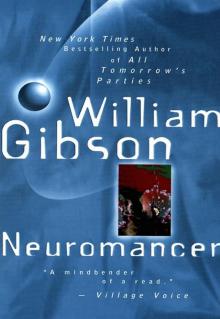 Neuromancer
Neuromancer Skinner's Room
Skinner's Room The Difference Engine
The Difference Engine Mona Lisa Overdrive
Mona Lisa Overdrive Zero History
Zero History The Peripheral
The Peripheral Idoru
Idoru Johnny Mnemonic
Johnny Mnemonic Count Zero
Count Zero Agency
Agency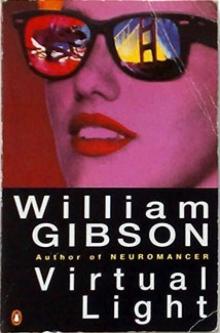 Virtual Light
Virtual Light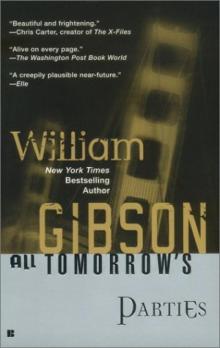 All Tomorrow's Parties
All Tomorrow's Parties The Miracle Worker
The Miracle Worker Disneyland with the Death Penalty
Disneyland with the Death Penalty Idoru tb-2
Idoru tb-2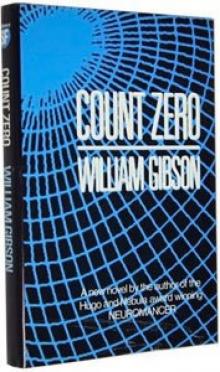 Count Zero s-2
Count Zero s-2 The Gernsback Continuum
The Gernsback Continuum New Rose hotel (tales)
New Rose hotel (tales)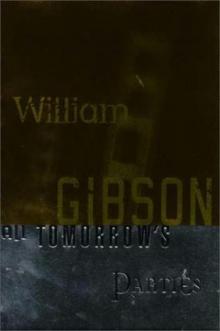 All Tomorrow's Parties bt-3
All Tomorrow's Parties bt-3 Hinterlands
Hinterlands Thirteen Views Of A Cardboard City
Thirteen Views Of A Cardboard City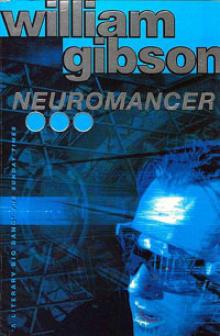 Neuromancer ts-1
Neuromancer ts-1 Virtual light b-1
Virtual light b-1